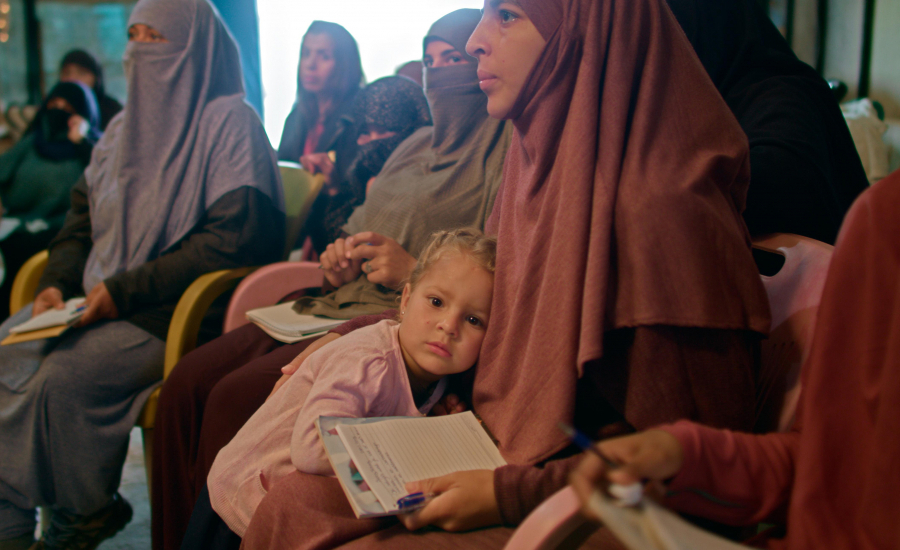07/08/2021
A portrait of a group of Western women who pledged their lives to ISIS, but now want to return home to restart their lives.
Director: Alba Sotorra Clua
Producer: Alba Sotorra Clua, Vesna Cudic, Carles Torres
Country: Spain, UK
In their homelands they are, to a large degree, household names: Shemima Begum in the UK, Hoda Muthana in the USA. But ironically these women, and dozens of others like them, are so well known precisely because they legally have no homelands, stripped of citizenship after they travelled to the Middle East, married ISIS fighters, and joined the radical Islamist organisation’s jihad against western imperial forces. The mainstream media coverage afforded to Begum, Muthana and company has generally ranged from the sceptical to the rabidly hostile; this is the background context for Alba Sotorra Clua’s The Return: Life After ISIS.
As the opening titles — as slickly assembled as everything that follows, complete with mildly thrillerish score music — graphically illustrate, Sotorra Clua’s intention here is to penetrate behind the headlines and examine the human faces to which these widely demonised names and media-constructed identities belong. Her opportunity to do this depends on access to Begum, Muthana, and around half a dozen others like them, effectively stateless individuals detained for months on end in the semi-makeshift Roj camp in Syria, close to the Iraqi border. Deciding what to do with them is, as one extracted news-report heard early on puts it, «a challenge for governments around the world».
Among the approximately 6000 inmates of Roj are dozens of «ISIS brides», some of them in their 30s or 40s but mainly in their late teens or early 20s. Sotorra Clua, working with her experienced editors Michael Nollet and Xavi Carrasco, compile a slew of talking-head testimonies through which certain elements repeatedly recur: the women were seduced by online propaganda exhorting them to support their beleaguered Muslim brothers and sisters in war-torn Syria; they made a perilous journey only to find conditions much harsher than they had anticipated; marrying in haste, they suffer the proverbial consequences.
Discovering the degree of individual repentance or remorse is not especially high on Sotorra Clua’s agenda here, resulting in a film which skims surfaces in stimulating and sometimes quite revealing ways, but which never seems to penetrate very deep behind the participants’ engaging surfaces. The filmmakers deploy familiar tricks and tropes from the documentary world, underlining the tragic elements of the narratives presented with mournful music; frequently we see the young children who reside in the camp with their mothers, their hapless innocence underlined by the framing and tinkly-piano score accompaniment.
The film is much stronger when concentrating on the day-to-day privations and joys of camp life over an extended period of time — intermittent date-stamps signal the passage of months across a two-year period — and when the palpable friendship, comradeship, and mutual support of the women is foregrounded. These natural connections, plus the women’s paths to self-realisation and independence, are further boosted by NGO initiatives designed to ease them down the route towards some eventual return to «normal» life. Hanging in the background, however, is the grim spectre of statelessness, the hostility of the women’s birth-nation governments (the latter both reflected and whipped up by the populist media), and the legal wrangles in which all find themselves painfully enmeshed.
Crucially, Sotorra Clua — fluently combining original material with archival interpolations from a range of media sources — gives the women space to express themselves. They discuss their mistakes, to offer expiation and remorse, emerging in the process as sympathetic, articulate, and intelligent people; her film gradually takes shape as a paean to female solidarity, empowerment, and resilience amid the toughest of physical and emotional circumstances. It’s especially hard to square the lively and quick-witted Begum of The Return with the shadowy, devious, malevolent succubus so familiar from the British media. How ironic that it should take Sky — founded by Rupert Murdoch in 1989 and effectively owned by him until 2018 — to counterbalance the perniciousness of Murdoch’s own right-populist media outlets on both sides of the Atlantic such as The Sun and Fox News, who have made so much toxic hay from Begum and Muthana’s cases. «Give me a second chance», asks Begum in the latter stages; an appeal which will find plentiful acceptance among the picture’s audiences wherever it is shown, even if the ears of British officialdom, in the Boris Johnson era, are likely to remain belligerently blocked.
Review written by Neil Young, published in MODERN TIMES REVIEW


